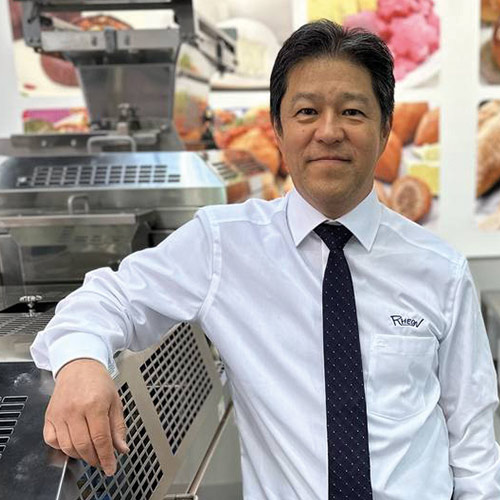
Successful plant-based frozen desserts strike a delicate balance between innovation, taste, and consumer satisfaction. Understanding market trends and consumer preferences is vital for appealing new products. When it comes to plant-based frozen desserts, consumers have specific expectations. They seek healthier indulgence, flavor variety, and even a touch of familiar dairy taste. Plant-based ingredients are associated with taste challenges. Flavor modulation technology plays an essential role in creating delightful plant-based frozen desserts. It helps to mitigate undesirable off-notes and to add back the richness and creaminess experience of conventional ice cream.

Sharing ideas to diversify your ice cream product by using different wafer products apart from the standard sugar cone.

Is a small green revolution taking place on the ice cream market? While in the past the enjoyment of ice cream mainly stood for indulgence and reward, where you could indulge in a little sweet sin, sustainability and health issues are becoming increasingly important. In this presentation, we want to use retail panel data to approach the question of whether vegan alternatives or sugar-reduced ice cream variants are now becoming more important on the market and whether no manufacturer will be able to avoid dealing with these topics in the future.

Tahsin Dag founded PAPACKS® in 2013 and serves as the managing director of a holding company with eight subsidiaries. He focuses on sustainable packaging, utilizing his experience with Danone and Red Bull. Since 2022, he has chaired The European Moulded Pulp Producers Association (EMPPA), which advocates for circular packaging made from recycled materials. Tahsin also advises businesses and politicians across Europe on sustainability.

In this presentation, we will explore the impactful role of Klüber Lubrication in enhancing energy efficiency across industrial applications, with a particular focus on compressor machines. Special lubricants not only prolong machinery life but also substantially reduce energy consumption. The highlight of this session will be a detailed success story where Klüber Lubrication’s innovative solutions played a pivotal role in helping a client achieve their business objectives through significant energy savings. This case will underline the effectiveness of our products and our commitment to supporting customers in achieving both environmental and economic benefits.

In the past, addition of strawberry extract to ice cream mix resulted in an ice cream that did not collapse (so-called “no-melt” ice cream). The cause of this effect has not been adequately studied. First, we showed that tannic acid added to cream created clusters of fat globules, mediated by protein-polyphenol complexes. Addition of tannic acid and polyphenol extracts to ice cream also resulted in decreased melting rate when addition levels exceeded some critical value, most likely because of these clusters. Fat content of the ice cream mix appeared to have a stronger effect on melt-down rate than protein content. As a side note, addition of polyphenols to ice cream also inhibited ice recrystallization during storage.
The inner workings of an ice cream scraped surface freezer are still largely unknown. The design of the dasher/beater determines the flow of ice cream through the freezer and governs the development of ice crystals, air cells and fat globule clusters, which affect the physical and sensory properties. Here, we studied 5 different dasher/beater designs, from solid to open with different internal beater designs. Residence time distribution curves as well as the microstructural elements were measured. Differences were seen among the dasher designs, mostly related to the volume displacement level of the dasher, although other factors were involved as well


Optimizing homogenization pressure for ice cream mixes is importantl not only for ensuring desired product quality but also for minimizing the total cost of ownership (TCO). A comprehensive grasp of the parameters influencing high homogenization efficiency and quantifying its impact on fat globules is essential for maximizing the benefits of homogenization treatment. By delving deeper into these aspects, manufacturers can enhance both product quality and operational efficiency while minimizing costs.

One of the challenges when formulating plant-based frozen desserts is to reproduce the structure usually obtained in ice cream. Pea protein is part of the solution, as it offers a combination of solubility, emulsifying properties, and of course contribution to the nutritional value. The presentation will share outlooks on the impact of pea protein on the mix properties and how it can be processed on ice cream equipment. It will also detail the functionalities of the frozen dessert in terms of texture, melting and sensory properties


Paper-based alternatives are emerging as a response to new legislation and sustainability trends that are transforming ice cream wrapping materials. This presentation will cover the following areas: an overview of traditional vs. new trends in ice cream wrapping, key considerations when working with paper-based materials, expected adaptations in wrapping equipment for new materials, and important points for secondary packaging and handling of wraps.

The US ice cream market performance resembles a rollar coaster since the pandemic. Historically low single digit growth jumped 10-fold as consumers hunkered down and sought comfort foods to help cope with a rapidly changing society. Manufacturer’s good times were short-lived as inflation and input costs hit hard making ice cream a discretionary item for many consumers. Even with significant price increases, ice cream dollar growth rates have returned to pre-pandemic levels. Restoring volume growth will depend on innovation that delivers on consumer needs. This presentation will focus on existing market challenges and what can be done to drive future growth.

In this presentation, we will explore the impactful role of Klüber Lubrication in enhancing energy efficiency across industrial applications, with a particular focus on compressor machines. Special lubricants not only prolong machinery life but also substantially reduce energy consumption. The highlight of this session will be a detailed success story where Klüber Lubrication’s innovative solutions played a pivotal role in helping a client achieve their business objectives through significant energy savings. This case will underline the effectiveness of our products and our commitment to supporting customers in achieving both environmental and economic benefits.



A study of pick up on extruded sticks with real chocolate coating (Magnum type). Showing how emulsifiers can help ice cream producers with chocolate problems such as keeping a constant pick-up during production.

This citrus fiber is the first to be recognized as an Upcycled Certified® ingredient. It supports dietary fiber intake while offering benefits such as emulsion stability, viscosity, enhanced mouthfeel, syneresis control, and water-holding capacity. Easily recognizable by consumers, this ingredient is instrumental in developing dairy- and plant-based ice cream products, including hardpack, bars, and soft-serve, to meet industry standards. It maintains quality, improves melt resistance, increases firmness, simplifies ingredient lists, and reduces costs without impacting the manufacturing process.

Practical report with online insight into the intelligent balance control of (TC) refrigeration systems & Heat recovery with energy savings of 10 – 30 %.

The presentation aims to demonstrate the organoleptic and functional benefits of fava bean protein isolate and its potential in enhancing the next generation of vegan frozen desserts to meet consumers’ desires for indulgence.

